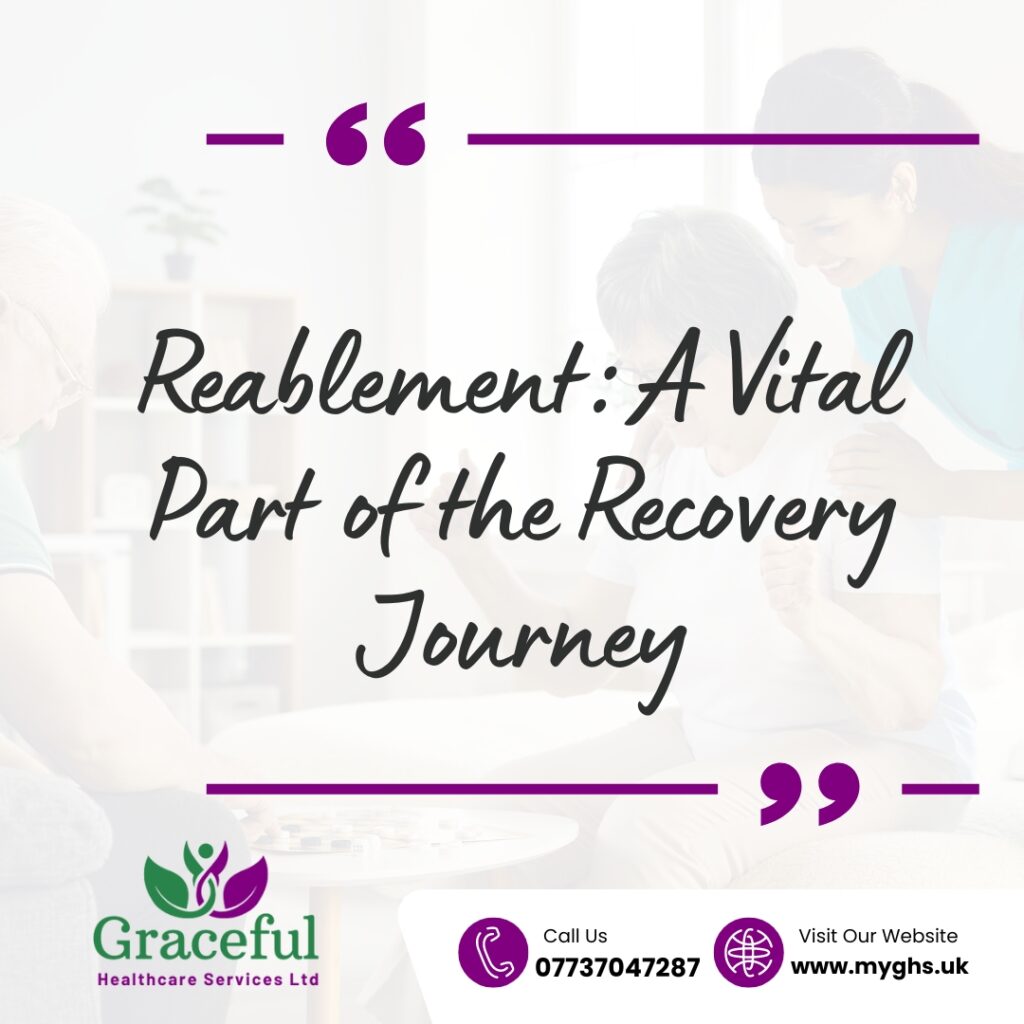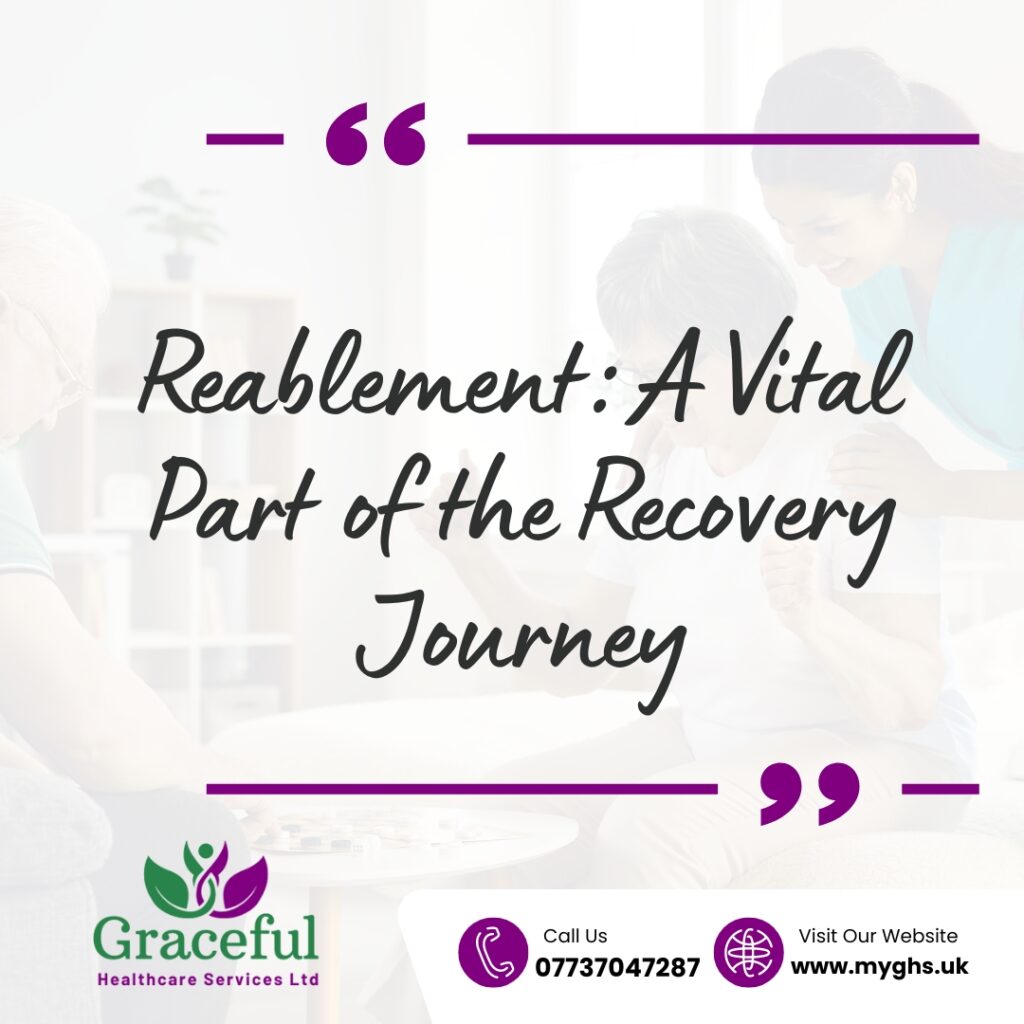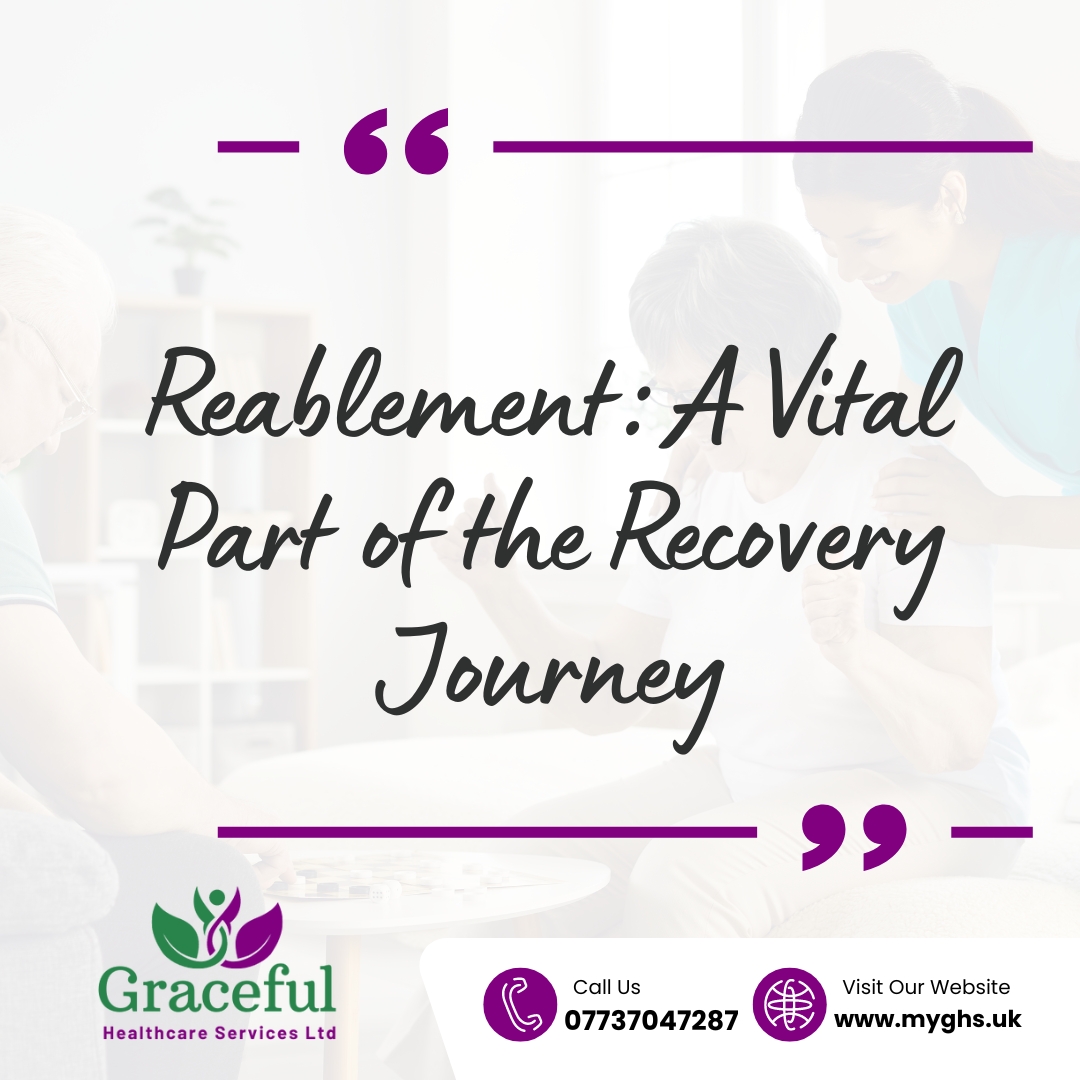Reablement: A Vital Part of the Recovery Journey

Table of Contents
- Understanding Reablement
- The Role of Reablement in Birmingham
- How Reablement Supports the Recovery Journey
- Reablement in Birmingham: Access and Availability
- The Importance of Personalisation in Reablement
- Success Stories: The Impact of Reablement on Recovery
- The Future of Reablement Services in Birmingham
- Choosing the Right Reablement Service
- Conclusion: Embracing Reablement as a Path to Recovery
In recent years, healthcare has increasingly focused on patient-centred approaches that promote independence and improve quality of life. One such approach that has gained considerable attention is reablement. This service, crucial in the recovery journey of many individuals, particularly the elderly or those recovering from illness or injury, is integral in promoting autonomy and supporting long-term health outcomes. For residents of Birmingham, accessing quality reablement services can significantly impact recovery and rehabilitation.
Understanding Reablement
Reablement is a short-term, intensive service designed to help individuals regain or maintain the skills needed to live independently after an illness, injury, or hospital stay. Unlike traditional care services that provide long-term support, reablement focuses on empowering individuals to relearn daily activities and build confidence in managing their own care.
The essence of reablement lies in its holistic approach, addressing both physical and emotional needs. The service typically lasts between six to twelve weeks, depending on the individual’s progress, and involves a multi-disciplinary team that may include physiotherapists, occupational therapists, and support workers. This team collaborates with the individual to develop a personalised care plan aimed at achieving specific, realistic goals.
The Role of Reablement in Birmingham
In Birmingham, reablement services have become an essential component of community-based healthcare, providing a crucial bridge between hospital discharge and a return to normal life. The city’s diverse population means that services must be adaptable and culturally sensitive, ensuring that every individual receives care tailored to their unique needs.
According to Birmingham City Council, reablement services are part of the broader framework of adult social care, designed to reduce the need for long-term support by promoting independence and self-care. This aligns with the national strategy to keep people living in their own homes for as long as possible, reducing the strain on hospital and residential care services.
How Reablement Supports the Recovery Journey

Reablement services in Birmingham and beyond play a pivotal role in the recovery journey. Here’s how:
- Promotes Independence: The primary goal of reablement is to help individuals regain the ability to perform daily tasks independently. This could include anything from getting dressed to preparing meals or managing medications. By focusing on what people can do rather than what they cannot, reablement fosters a sense of autonomy and self-worth, which is crucial for long-term recovery.
- Reduces Hospital Readmissions: One of the critical challenges in post-hospital care is the risk of readmission due to complications or a lack of proper support. Reablement addresses this by providing tailored support that reduces the likelihood of further hospital visits. A study by National Library of Medicine highlights that effective reablement services can reduce hospital readmissions by up to 40%, which is a significant figure given the pressures on the NHS.
3. Cost-Effective Care: Reablement is not just beneficial for the individual; it also offers significant cost savings for the healthcare system. By reducing the need for long-term care and hospital readmissions, reablement can lead to substantial financial savings. Research suggests reablement services can be up to 60% cheaper than conventional home care services, making it a cost-effective option for both local authorities and the NHS.
Reablement in Birmingham: Access and Availability
For those living in Birmingham, accessing reablement services is relatively straightforward, but awareness of the availability and benefits of these services can sometimes be lacking. Most reablement services in Birmingham are provided through local authority social services departments or in partnership with private healthcare providers like Graceful Healthcare Services, which offers personalised and compassionate reablement support tailored to individual needs.
Typically, the process begins with an assessment by a healthcare professional, such as a GP, social worker, or hospital discharge coordinator, who will determine whether reablement is appropriate. If eligible, the individual is referred to a reablement service provider, where a care plan is developed in collaboration with the individual and their family.
In Birmingham, there are several options for reablement support, ranging from in-home care to specialised centres that offer more intensive rehabilitation services. The city’s reablement services are known for their flexibility, with options for both short-term and longer-term support, depending on the individual’s progress.
The Importance of Personalisation in Reablement

One of the key strengths of reablement services is their focus on personalisation. No two recovery journeys are the same, and reablement recognises this by providing bespoke care plans tailored to the individual’s specific needs, preferences, and goals.
In Birmingham, this personalisation is often reflected in the wide range of services offered. For example, some individuals may require assistance with mobility and physical rehabilitation, while others may need support with cognitive or emotional challenges following an illness or injury. The multi-disciplinary nature of reablement teams allows for a comprehensive approach that addresses all aspects of recovery.
Moreover, reablement in Birmingham is increasingly embracing technology to enhance personalisation. For instance, telecare services, which involve remote monitoring and support through digital devices, are becoming more common. This allows individuals to receive timely interventions while remaining in the comfort of their own homes, further promoting independence and reducing the need for hospital-based care.
Success Stories: The Impact of Reablement on Recovery
The positive impact of reablement on recovery journeys cannot be overstated. Many individuals who have accessed these services in Birmingham and UK at large report significant improvements in their quality of life and ability to manage daily activities independently.
One such success story involves Client A in Birmingham who had suffered a stroke. After being discharged from the hospital, she was referred to a reablement service, where she received intensive physiotherapy and occupational therapy support. Over several weeks, she gradually regained her ability to walk and manage household tasks, eventually achieving her goal of living independently again. This case highlights how reablement can make a real difference in the lives of those recovering from serious health events.
Another example is Client B recovering from a severe respiratory illness. Initially unable to manage his own care, he was referred to a reablement service that provided both physical rehabilitation and emotional support. With the help of his reablement team, he was able to regain his strength and confidence, ultimately returning to work and resuming his normal life.
These stories underscore the transformative potential of reablement services, particularly when they are delivered with compassion and a focus on the individual’s unique recovery journey.
The Future of Reablement Services in Birmingham

As the population ages and the demand for healthcare services continues to grow, the importance of reablement in the recovery journey is likely to increase. Birmingham, with its diverse and dynamic population, is well-positioned to lead the way in developing innovative and effective reablement services that meet the needs of all its residents.
Looking ahead, there are several trends and developments that could shape the future of reablement in Birmingham:
- Integration with Other Services: One of the key areas of development is the integration of reablement with other health and social care services. By creating a seamless continuum of care, individuals can receive more coordinated and comprehensive support, improving outcomes and reducing the risk of gaps in care.
- Increased Use of Technology: As mentioned earlier, technology is playing an increasingly important role in reablement. From telecare to mobile health apps, digital tools are helping to enhance the effectiveness of reablement services by providing real-time monitoring, support, and feedback.
- Focus on Preventative Care: Reablement is not just about recovery; it is also about prevention. By helping individuals regain their independence and self-care abilities, reablement can reduce the risk of future health problems and the need for more intensive care services. In Birmingham, this preventative approach is likely to become more prominent as healthcare providers seek to address the challenges of an ageing population.
- Enhanced Training for Reablement Professionals: The effectiveness of reablement services depends heavily on the skills and expertise of the professionals delivering them. In Birmingham, there is a growing emphasis on providing specialised training for reablement staff, ensuring they have the knowledge and tools to deliver high-quality care.
Choosing the Right Reablement Service
For those in Birmingham or the surrounding areas, choosing the right reablement service is a crucial decision that can significantly impact the recovery journey. With so many options available, it’s essential to consider several factors to ensure that the chosen service meets the individual’s needs and preferences.
When evaluating reablement services, consider the following:
- Experience and Expertise: Look for providers with a proven track record of delivering high-quality reablement services. This includes not only the qualifications of the staff but also the provider’s experience in handling specific conditions or recovery needs.
- Personalisation of Care Plans: Ensure that the service offers personalised care plans tailored to the individual’s unique needs and goals. This is particularly important for those with complex or long-term conditions that require specialised support.
- Availability of Multi-Disciplinary Support: Reablement is most effective when delivered by a multi-disciplinary team that can address all aspects of recovery. Make sure the service provides access to a range of professionals, including physiotherapists, occupational therapists, and social workers.
- Flexibility and Adaptability: The recovery journey is not always linear, and individuals may need different levels of support at different times. Choose a service that offers flexible care plans that can be adapted as the individual’s needs change.
- Reputation and Reviews: Research the provider’s reputation by reading reviews and testimonials from previous clients. This can provide valuable insights into the quality of care and the experiences of others who have used the service.
For residents of Birmingham, Graceful Healthcare Services offers a range of reablement services that are designed to support individuals at every stage of their recovery journey. With a focus on personalised care and a commitment to promoting independence, Graceful Healthcare Services is a trusted provider in the community, helping individuals achieve their recovery goals with dignity and compassion.
Conclusion: Embracing Reablement as a Path to Recovery

Reablement is more than just a service; it is a philosophy that empowers individuals to take control of their recovery journey and regain their independence. In Birmingham, reablement has become an integral part of the healthcare landscape, providing essential support to those transitioning from hospital care to independent living.
As the demand for reablement services continues to grow, it is vital that healthcare providers, policymakers, and the community at large recognise the value of this approach and invest in its future development. With the right support, individuals can achieve remarkable outcomes, improving their quality of life and reducing the need for long-term care.
For those in Birmingham seeking to embark on their recovery journey with confidence, reablement offers a path to independence and a brighter future. Whether through local authority services or providers like Graceful Healthcare Services, reablement is a vital part of the recovery journey that deserves recognition and support.
In the end, reablement is about more than just physical recovery; it is about restoring hope, dignity, and the ability to live life to the fullest. By embracing reablement as a core component of the recovery journey, we can help individuals across Birmingham and beyond achieve their fullest potential, one step at a time.
Disclaimer: This article is intended for informational purposes only and does not constitute medical advice or professional care recommendations. The information provided is based on current research and best practices at the time of writing. Readers should consult with healthcare professionals, qualified care providers, or local authorities before making decisions about reablement or any other form of care. While efforts have been made to ensure accuracy, Graceful Healthcare Services Ltd and the author do not guarantee the completeness or currency of the information presented. Individual circumstances may vary, and personalised advice should always be sought.
References
- National Library of Medicine: https://www.ncbi.nlm.nih.gov/pmc/articles/PMC5129137/
- Birmingham City Council. (2023). How Adult Social Care Works https://www.birmingham.gov.uk/info/20018/adult_social_care/2703/how_adult_social_care_works






Leave a Reply